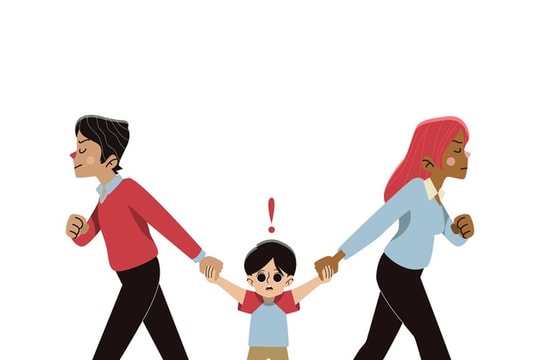10 mistakes parents should avoid when raising children
Parents should avoid discussing topics that show irresponsibility of adults; do not compare and control all of children's behavior.
1. Excessive flattery
Have you ever said things like, "You are special and unique in this world" to build your child's confidence and self-esteem? Your intentions are good, but research by scientists at Ohio State University (USA) has warned about the unexpected consequences of similar statements.
Brad Bushman, co-author of the study, said that while it is important to encourage children, too much emphasis and flattery can lead to arrogance and self-importance. Parents need to find a balance.
2. Avoid any sensitive topics
Some parents tend to avoid discussing topics related to sex and sexuality with their children. Even when their children are teenagers, they still think that the topic is too sensitive and that their children do not have the appropriate language to discuss it. They hope that their children will learn about it at school or from their friends. However, according to scientific research, this view shows irresponsibility on the part of parents.
If parents often ignore and do not have serious conversations to guide, teenagers may have sex early or lack knowledge about safe sex.
3. Frequent threats
Sometimes parents use aggression to scare their children and try to correct their behavior. For example, they might say, "If you don't stop, I'm going to throw you to that man and he's going to lock you up!" This tactic can be quite effective, but psychologists advise against it.
In fact, when children are afraid, they cannot think carefully about their behavior. They are also very anxious when they see the police, doctors or people that parents often use to scare them. Moreover, because the brain is used to quickly processing information that causes fear, children are more likely to feel afraid than before. Therefore, threatening is not a disciplinary method that brings long-term effectiveness but also causes many problems in the future.
4. Screaming
Imagine your child is misbehaving. You ask him to calm down, from once to two or three times, then he can't stand it and explodes.
Yelling is actually an effective way to release our emotions immediately. Some people believe that yelling is the most convenient way to solve problems. However, have you ever thought about the consequences of this way of raising children? In fact, yelling can make children's behavior worse, and it can even cause depression in children.
|
5. Find excuses to blame for children's bad behavior
The relationship between parents and children can be reflected in the saying "You reap what you sow". Scientific studies confirm that children absorb values from their parents more than from anyone else. They copy your behavior. Therefore, if your child spends most of his time with his parents and has bad behavior, you should look at yourself first.
If you fear that society is the main source of influence on children, experts also confirm that school or peer environment has the main function of reinforcing the knowledge and values that children have received at home.
6. Expectations are too high
No parent wants their child to be a failure. However, some parents set their expectations too high. Expectations will motivate children to perform better, but if the goals are unrealistic, children may develop disorders such as insomnia, anger, fatigue or anxiety.
"Children become afraid of making mistakes when their parents expect them to do everything perfectly," explains Ryan Hong, a scientist at the National University of Singapore. "Take a moment and think about whether you're pushing your child more than necessary."
7. Inconsistency
One day you ask your child to clean up his toys, then the next day you do it for him without saying a word. Yesterday you were angry and punished him for a harmless prank, but today you are cheerful and let him do whatever he wants for the rest of the day. While mom is frowning in disapproval of his behavior, dad is smiling at him. These are examples of an unstable environment that leaves children confused about whether they are doing what their parents expect.
Scientists say that this instability can negatively impact self-esteem development, causing trauma and depression. Therefore, you should pay attention to setting appropriate rules and limits in the family, strictly following them so that children understand what is going to happen and prepare how to react.
8. Compare often
Have your parents ever compared you to someone else? "Jack is such a good boy, but you are such a bad boy!", "Emily can count to 100, but you only stop after 10"...
Scientists advise us not to repeat this mistake with our children, because comparing children with others lowers their self-esteem and self-worth. It also creates a distance between parents and children, because children often feel insecure and lose trust in you. Children need love and support from their parents in all circumstances, so instead of trying to say comparisons to make them feel discouraged and disappointed, you should focus on talking about the problem and find ways to help them improve.
9. Punishment by whipping
Many people believe that spanking is the best form of discipline. They actively use this method when disciplining their children.
However, experts say physical abuse has a wide range of consequences, including antisocial behavior, mental disorders, and alcohol and drug addiction. Children who are regularly spanked are also at higher risk of heart disease and asthma.
10. Control all of your child's behavior
Scientists from the American Psychological Association note that parents who control their children too much will make them unable to manage their own emotions. When parents constantly tell them what to do, children will have many problems with their ability to adapt socially, make friends or analyze their behavior.
Therefore, if you see that your child is capable of handling the situation without help, let him do it himself. You can guide him on how to overcome difficult situations but do not impose. Talking about current emotions and sharing some ways to cope with stress will help your child in the long run.



.jpg)


.jpg)


